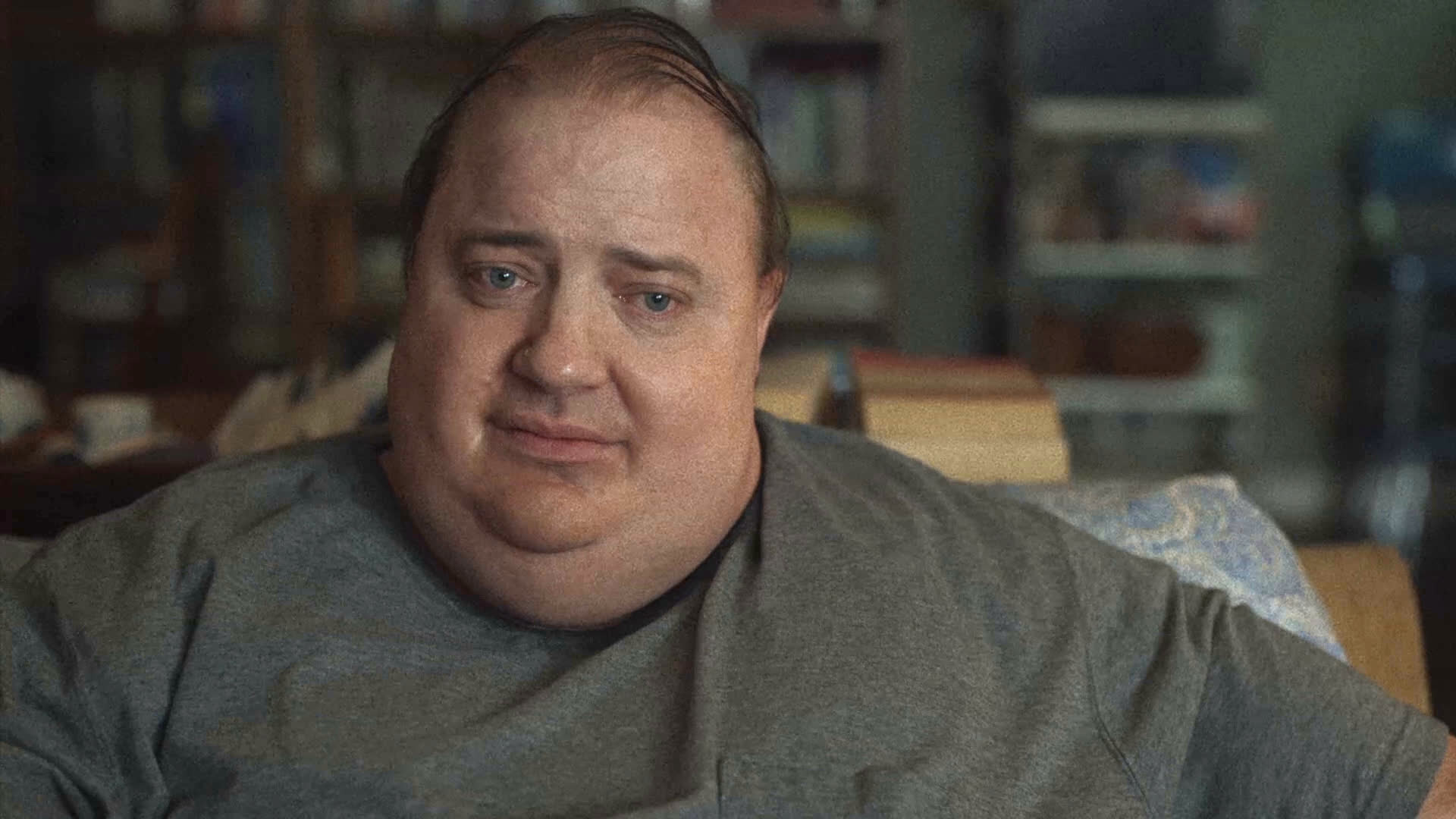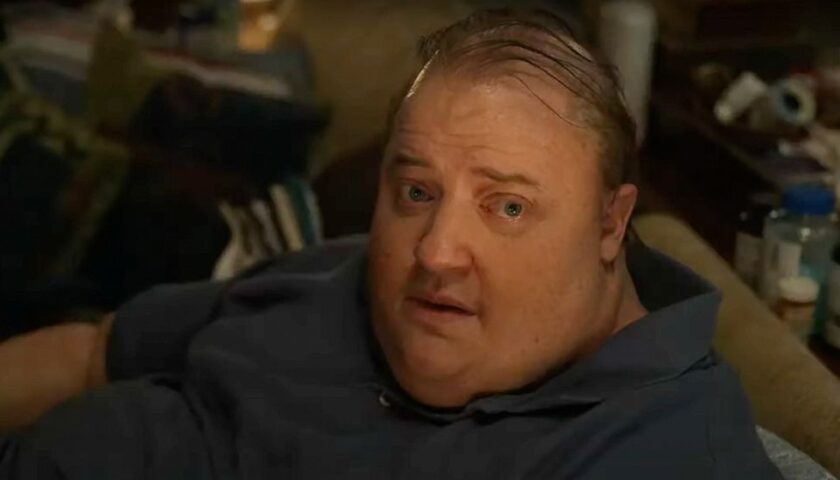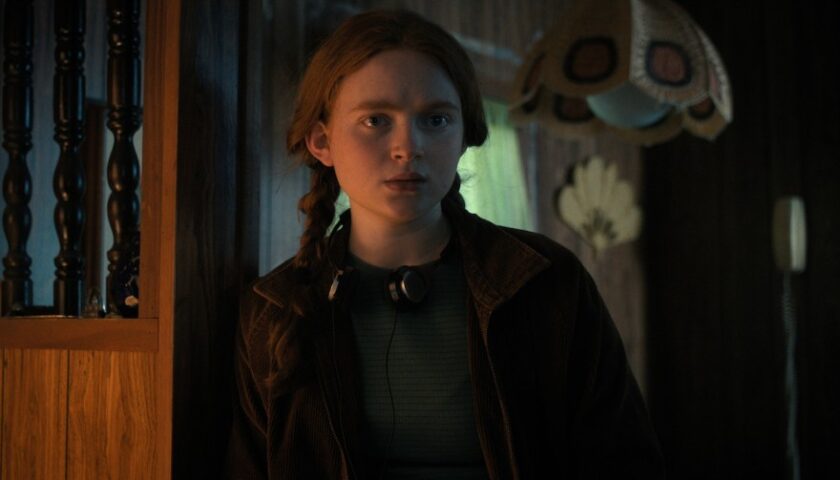“The Whale” (2022) – Since Darren Aronofsky’s “The Whale” premiered at the 2022 Venice Film Festival on Sept. 4 and then played shortly after at the 2022 Toronto International Festival, more praise has been thrown at Brendan Fraser – for his portrayal of Charlie, a 600-pound recluse – than Pope Francis, Jane Goodall, and Lionel Messi combined.
With good reason.
Fraser delivers the most passionate and visceral lead actor performance of the year in a role that teeters on the edge of danger and clings to the tiniest buoy of hope, one that barely floats on a sea of heartbreak.
Charlie’s sorrow didn’t flood his psyche overnight, but it spawned through a personal tragedy that writer Samuel D. Hunter reveals somewhere during the film’s knotty, turbulent 117-minute runtime.
Hunter adapts his screenplay from his 2012 play, and “The Whale” feels like a stage production. The movie only features a handful of characters, and the events primarily reside in one locale, Charlie’s modest, cluttered apartment. This is his place of work, as he teaches online English courses at a local college. While Aronofsky regularly features a collection of students’ faces on Zoom calls, Charlie’s camera doesn’t operate. His late teen/early-20-something pupils can only see a blank, black screen, where Charlie’s reflection should inhabit.
The audience, however, does witness the protagonist, a regretful, self-loathing middle-aged human being whose middling days string together over months and years. Charlie buries his grief through food and then barricades himself in his second-story bungalow, shut off from the physical world except for Liz (Hong Chau), a nurse who frequently stops in to take his vitals and stress over his condition. Liz is also his fretful friend.
A two-person play, a movie does not quite make, so Aronofsky and Hunter introduce a few additional characters and a threat, Charlie’s perilous health. His excessive size makes simple movements off the couch an all-day chore. With Charlie’s constant struggle for oxygen – along with an ominous, thunderous score that storms inside the lead and his dwelling – the disconcerting tension in the air breathes unnerving agents of strife.
Could Charlie go at any moment? It certainly seems like it.
One character is Thomas (Ty Simpkins). He’s a young, impressionable missionary, one hoping to save Charlie in a spiritual sense. Throughout the film, Fraser’s Charlie feeds a sense of mortal dread on the screen, but this story attempts to respire life to our hero through hope. Unfortunately, religious amends are not a chosen direction, and Thomas’ recurring presence does not register on Charlie’s salvation register, nor ours. Instead, rescuing Charlie from his current abyss will need to come in the form of his estranged teenage daughter, Ellie (Sadie Sink).
At least, one would think.
While Charlie and Liz carry oceans of depth, motivations for their current outlooks, and a deeper connection than initially thought, Ellie is the most one-note character to grace the screen since Michael Myers in John Carpenter’s “Halloween” (1978). Ellie is a miserable, cantankerous, mean-spirited, selfish creep, and – on the surface – her lone presence in this movie can serve as a poster child for birth control. Her deliberately vile behavior makes the girl a more unlikable villain than a composite character of Regina (Rachel McAdams) from “Mean Girls” (2004), Scut Farkus (Zack Ward) from “A Christmas Story” (1983), and Biff Tannen (Tom Wilson) from the “Back to the Future” series.
Aronofsky, Hunter, and Sink offer zero nuance with Ellie. Since Ellie forever sprays her vicious bile in Charlie’s direction, she garners no pity or sympathy from the audience, or at least this critic. Even though Charlie attempts to make amends for past wrongs, his rose-colored glasses are – in reality – clouded with mud, and the relationship between these two immovable objects fails to garner authenticity. Well, it rings true in Charlie’s mind, anyway.
One could find parallels between Charlie and Ellie’s relationship with Randy (Mickey Rourke) and Stephanie’s (Evan Rachel Wood) in Aronofsky’s “The Wrestler” (2008). Both Stephanie and Ellie harbor resentments against their absent fathers. However, at least Stephanie offered some optimism for reconciliation, while Ellie grants us none.
However, Charlie still relents to make peace with his past and his daughter. Hence, this is where “The Whale” earns its title. It’s not necessarily because of Charlie’s weight. From a literary perspective, as contemptible as Ellie and her essence are, there’s a method to Aronofsky’s, Hunter’s, and Sink’s madness. Ellie’s not an immovable object but an irresistible force, and an elusive one. Still, cinematically, “The Whale” garners frustration. Then again, so can life, and Charlie’s the epitome of this exasperating concept.
Several friends and colleagues – who have not yet seen “The Whale” – have said to me, “I can’t believe that Brendan Fraser gained all that weight for the movie.”
He did not. Fraser wore a 300-pound prosthetic suit or pieces of one to play Charlie, but the practical effects look genuine. More importantly, Brendan’s emotional performance made you feel that he did, along with the potential for an on-screen health crisis. Hand the man the Best Actor Oscar. He earned it.
⭐⭐⭐ out of ⭐⭐⭐⭐
Directed by: Darren AronofskyWritten by: Samuel D. Hunter
Starring: Brendan Fraser, Hong Chau, Sadie Sink, Ty Simpkins, and Samantha MortonRated: R
Runtime: 117 minutesImage credits: A24







